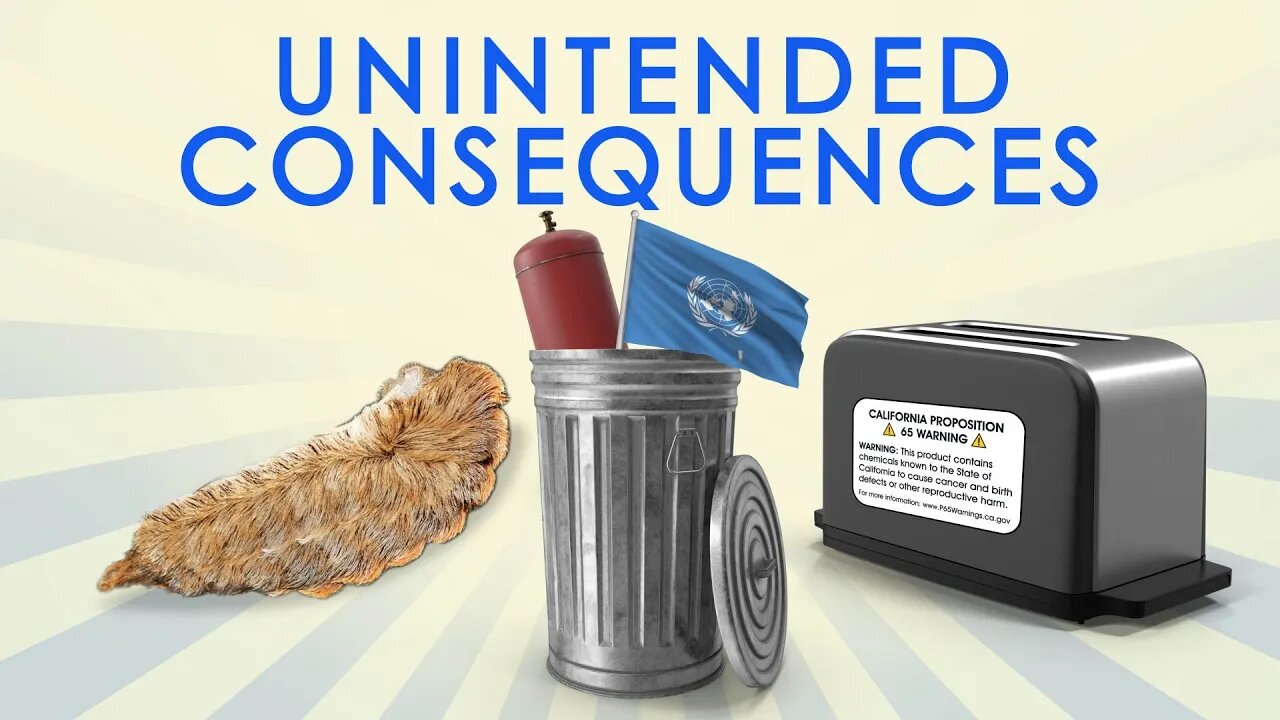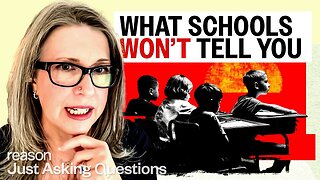Premium Only Content

Great Moments in Unintended Consequences (Vol 12)
Good intentions, bad results.
Watch the whole series: https://www.youtube.com/watch?v=1lUrH4Sbgh8&list=PLBuns9Evn1w9XhnH7vVh_7C65wJbaBECK&index=1
Do you know a great moment in unintended consequences? Leave a comment or email us at [email protected].
-----
Part One: Net Benefits
The year: 2012
The problem: Birds are congregating on the Texas Medical Center campus and doing…bird things.
The solution: Attach nets to the large oak trees on campus, forcing birds to take their business elsewhere.
Sounds like a great idea, with the best of intentions. What could possibly go wrong?
Turns out, birds eat bugs. With the birds gone, the trees became a haven for cute furry-looking critters that happen to be North America's most venomous caterpillar. Contact with these toxic misery tribbles can cause intense radiating pain, vomiting, fever, convulsions, paralysis, and even death. With nets up and apex predators gone, researchers determined the population of these comb-over pain merchants increased by a whopping 7,300 percent. Bad news for anyone, but especially a vulnerable population seeking health care at, say, oh, I don't know, a medical center campus.
You know what they say: Flock around and find out.
Part Two: Prop Comedy
The year: 1986
The problem: toxins in California!
The solution: Proposition 65! A ballot initiative that included a provision making it illegal for businesses to "expose individuals to chemicals known to cause cancer or reproductive toxicity without first giving clear and reasonable warning."
Sounds like a great idea, with the best of intentions. What could possibly go wrong?
When the warning requirements were established in 1988, 235 chemicals made the cut. Today there are over 900 compounds on the Proposition 65 list, including alcoholic drinks, Chinese-style salted fish, and wood dust. Even cocaine is on the list, so if your eight ball doesn't have a warning label, your dealer is breaking the law.
With penalties for noncompliance including fines of up to $2,500 per violation per day and overzealous litigators looking for their cut, business owners came to the rational conclusion that the cost of a label was less than the cost of litigation. The result? Warning labels everywhere regardless of the severity of risk or degree of exposure. In bars, restaurants, hotels, spas, ski resorts, schools, and Disneyland. On golf clubs, lamps, toasters, kids toys, sunglasses, potato chips, pancakes, pumpkin puree, and even trees. These signs have become so common that one study found Californians have learned simply to ignore them.
But, we don't wanna get sued either, so…
Warning: This video contains information on Prop. 65, known to the state of California to cause ambiguity between things that are dangerous and things that are harmless. For more information, go to holycrapthisisreallynotworkingoutthewaywehadplanned.ca.gov
Part Three: Cold Hard Cash
The year: 2005
The problem: Greenhouse gases are destroying the planet!
The solution: A system devised by the United Nations (U.N.) Intergovernmental Panel on Climate Change rewards companies disposing polluting gasses with carbon credits, which can later be turned into cash. The more harmful the gas being disposed, the more credits are awarded.
Sounds like a great idea, with the best of intentions. What could possibly go wrong?
Hydrofluorocarbon-23 (HFC-23), a manufacturing byproduct of the common coolant hydrochlorofluorocarbon-22 (HCFC-22), was seen as particularly harmful, allowing a large number of credits when destroyed. So manufacturers—predominantly in India and China—ramped up production of the coolant, creating more of the dangerous byproduct, which they immediately destroyed. The system netted the manufacturers tens of millions of dollars a year. Some producers made twice as much from the tax credit than from sales of the actual refrigerant.
Increased manufacturing of the coolant, itself a contributor to global warming, kept the market price competitively low, discouraging air conditioning and refrigeration companies from switching to less harmful alternatives.
When the U.N. announced a plan to stop the scheme, Chinese producers threatened to vent their huge stockpile of the gas directly into the atmosphere—what some activists labeled environmental extortion.
Nice climate you got there.
Great moments in unintended consequences: good intentions, bad results.
Do you know a great moment in unintended consequences? Email us at [email protected].
Photo credit: Carterhawk/Wikimedia
-
 1:34:39
1:34:39
ReasonTV
1 month agoHow kids get indoctrinated | Deb Fillman
1.06K -
 LIVE
LIVE
Dr Disrespect
1 hour ago🔴LIVE - DR DISRESPECT - 10 WINS ON CONTROLLER - BO7 TOMORROW
847 watching -
 LIVE
LIVE
Steven Crowder
2 hours agoThe Left is Violent | Change My Mind
62,406 watching -
 1:08:10
1:08:10
The Rubin Report
1 hour agoAOC Doesn’t Realize How Much She Hurt Dems Shutdown Chances by Saying This
5.76K12 -
 LIVE
LIVE
The Shannon Joy Show
1 hour agoTrojan Horse Trump Whores Out To Pfizer AGAIN W/ $70B Deal To mRNA - LIVE W/ Sasha Latypova!
314 watching -
 LIVE
LIVE
LFA TV
13 hours agoLIVE & BREAKING NEWS! | WEDNESDAY 10/1/25
4,590 watching -
 30:49
30:49
Rethinking the Dollar
1 hour agoMarkets Panic: Government Shutdown Sends Gold & Bitcoin Higher | Morning Check-In: Let's Talk...
92 -
 LIVE
LIVE
Trumpet Daily
53 minutes agoTrumpet Daily LIVE | Oct. 1, 2025
416 watching -
 1:00:55
1:00:55
VINCE
3 hours agoSOMBRERO-GATE! | Episode 137 - 10/01/25
157K161 -
 LIVE
LIVE
MYLUNCHBREAK CHANNEL PAGE
3 hours ago1000's of Miles of Tunnels
697 watching